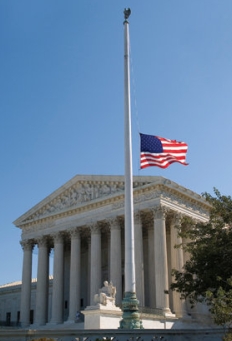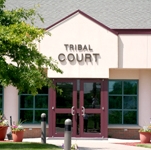Supreme Court Justices Today Are Unlikely to Die with Their Boots On
 Since 1789, 102 men and one woman have left the United States Supreme Court after varying periods of service. Forty-seven of the 103 died while still on the Court, while the other 56 retired.
Since 1789, 102 men and one woman have left the United States Supreme Court after varying periods of service. Forty-seven of the 103 died while still on the Court, while the other 56 retired.
Dying in office was once a much more frequent occurrence than it has been in the modern era. Of the 57 justices appointed to the Supreme Court prior to 1900, exactly two thirds (38) died in office. In contrast, since that time, 39 of 46 justices (85%) have left the Court by retirement.
Moreover, over the past 60 years, dying while still on the bench has become quite rare. Since Justice Robert Jackson died unexpectedly in 1954, 23 justices have left the Court and only one, Chief Justice William Rehnquist, died while still on the bench. For the half century between 1955 and 2005, there was not a single death of a sitting Supreme Court justice.
Why was it so much more common for justices to die in office during the Court’s earlier history?
A shorter life span for the justices is clearly part of the answer. Seventeen of the first 38 justices to die while in office died prior to their 70th birthday, and four of these, Wilson (56), Iredell (48), Trimble (52), and Barbour (58), died before reaching the age of 60. In contrast, the six justices who have retired since 1990—Souter (age 69), Stevens (90), O’Connor (75), Blackmun (85), White (76), and Marshall (83)—had either reached, or were approaching, their 70th birthdays at the time they stepped down.
Stricter pension eligibility requirements may also have been a factor in the reluctance of earlier justices to resign. For most of the 19th century, Supreme Court justices were eligible for a retirement pension only if they were 70 years old and had served on the Court for more than 10 years.
The best example of the impact of this rule can be seen in the case of Supreme Court Justice Ward Hunt. Hunt was appointed to the Court in 1872 by President Grant, but suffered from ill health that required him to miss part of the 1877 and 1878 terms of the Court. Then, in January 1879, he suffered a paralyzing stroke that left him incapable of speaking.
At the time of his stroke, Hunt was 68 years old and had served on the Court for six years. Although his affliction left him incapable of hearing cases or writing opinions, Hunt refused to resign from the Court for three years until Congress finally passed a special amendment to the federal pension laws that allowed him to retire. Hunt then retired immediately and lived in Washington for another four years, supported by his pension.
Other early justices chose to remain on the Court in spite of debilitating illnesses for political reasons. For example, in early 1880, Justice Nathan Clifford also suffered a stroke that left him debilitated. However, rather than resign, Clifford, a Democrat, chose to remain on the Court even though he could not participate in the deliberations in hopes that a Democrat would be elected president in the fall of 1880 (and could then appoint his successor). When Republican James Garfield was elected instead, Clifford still refused to resign and instead pinned his hopes on recovery. However, he never regained his health and died on July 25, 1881, a little more than three weeks after President Garfield was shot by the assassin, Charles Guiteau.
The performances of Supreme Court justices at the end of their careers has been a topic of interest to political scientists and legal scholars. Perhaps the most thorough study of that phenomenon is Artemus Ward’s Deciding to Leave: The Politics of Retirement from the United States Supreme Court (2003). Our own Professor Chad Oldfather and Todd Peppers of Roanoke College explore the issue as it applies to chief justices in a forthcoming article in the Marquette Law Review.


